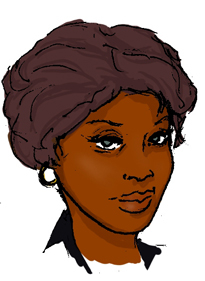Dear Mother Wit,
I’m a biracial mother married to a black man and we have two kids, ages 8 and 2, and another on the way. When we go to one particular family’s house, my toddler acts out more than usual and recently, at a dinner party, he really showed out. He stood up in a chair, made his dad drop his drink and ran all over the house like a crazy person, ignoring both my husband and I when we told him to listen to us and sit down. I even tried spanking and ignoring him, but he wasn’t listening and he kept crying.
I felt so self-conscious in front of the other family, which is all black. I’m sure they were judging my parenting skills. Their children, ages 5 and 3, acted better and I couldn’t help but to feel like they were expecting something different from our parenting. I know I need to be more consistent with my disciplining, but how do I parent in public and keep control over how I choose to do so in front of a Black audience?
— Parenting in Public
 Dear Parenting in Public,
Dear Parenting in Public,
Oh boy, let me tell you something: there is nothing worse than the side-eyes, blank stares, judgment and general funkiness Black folk toss your way when it looks like you can’t control your kid.
I’ve seen a rainforest full of shade heaped on mamas who couldn’t keep their kids in check at the grocery store, in church service, on public transportation and yes, even at their own homes when company is over. I’ve been there, trust me: my older daughter went through her “Terrible Twos” phase at about age three, and when I’d take her to visit my mother and her friends, those old ladies would practically hold prayer circles and séances to summons up a little “get right” for my wild child, who would cry, scream, squirm and fall out no matter who was in the room, what they were saying or how many death glares they would toss her way.
My younger daughter got more of the same when, as a toddler, she’d show up to a room full of Black folks and refuse to smile and talk and charm her way into everyone’s good graces. The temptation to put a little extra into my disciplining techniques was real: it seemed like it would be easier to pop the meaty part of their fat legs than go up against the judgmental demands of a bunch of stern old ladies who’d swear on a stack of Bibles that their kids never had tantrums, always followed directions and could catch a right hook in front of anybody with eyes if they dared step out of line in public.
Thing is, two-year-olds don’t really give a good hot doggone who’s watching or what onlookers think about their questionable behavior. They’re two. If they want to cry, run, fall out, scream, pout, stomp, laugh like maniacs, do the Dougie and drop into a deep sleep on the kitchen counter after all that Tomfoolery, they will do that. Because that’s what two-year-olds do.
If I’ve said it once I’ve said a million times: toddlers act out because they don’t know how to express themselves the way mature humans with words do. This is because they can’t yet talk. So if they’re angry, they can’t say, “Look here, I’m mad and I need you to fix that.” Instead, they’ll go ham and toss up the room until somebody figures out the 411 on why they’re mad and how they expect it to be handled. It’s nothing personal. They’re not being bad. They don’t need to be beaten to an inch of their lives or shown a wooden spoon to fall in line. They need you to figure out quickly what their needs are and handle them so that they can get back to the fun.
But you know what? This isn’t about getting control of your kid in front of others. It’s about feeling comfortable in your parenting choices, even in the face of relentless, hurtful judgment from people who think you suck because you seem like you can’t control your kid.
The best way to deal with that is to:
1. Have a plan for how to handle your kids’ tantrums—one that doesn’t include beating your baby to appease the audience watching the antics. He cries or falls out, pick him up, go somewhere quiet, let him get calm, figure out what the problem is (outside the prying eyes of the old ladies) and handle that madness like Olivia Pope does in “Scandal.”
2. Come with some words prepared for the people who insist on telling you how to discipline your kid. Whenever one of my mother’s friends would fix their mouths to question why I didn’t hit my daughters, why I didn’t relax their hair or why I didn’t yell at or snatch them up when they cried or got out of pocket, I came with this: “She’s acting her age. She’ll have it together by the time she’s off to Spelman.” Anybody who had a comeback got a very simple, “Don’t worry, I’ve got this.” They could stew all they wanted to, but usually, nobody had much else to say after I insisted they stay out of my business.
3. Be prepared to leave. Real talk: you have an audience ready, willing and able to tell you how to discipline your child and pass judgment because you’re giving them a show. If taking your child out of the room and giving him a chance to get calm doesn’t work, politely tell your hosts that your son is too cranky to be good company and take him home. No, children should not be the baller, shot caller of your lives, but really, there’s only a short window of time when your two-year-old will act like a two-year-old, and soon enough, he’ll have a handle on his feelings, emotions and words and be much too busy having fun to ruin yours.


Recent Comments